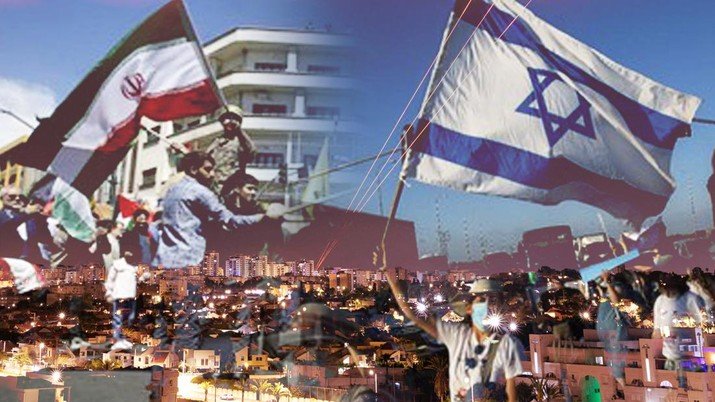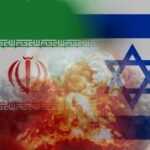With the Israel Iran news now erupting into confrontation, the situation in the Middle East has once again become hazardous. A striking series of military actions, diplomatic ploys, and counterattacks has brought the Israel-Iran conflict to the world’s attention. To put readers in a position to observe and comprehend the events and what they signify for the future, this essay aims to disentangle the events, provide background information on the causes, and analyse the effects of the most recent escalation.
Background: Rising Tensions Between Israel and Iran
The Israel Iran news cycle has for years fed the gluttony of stories about covert attacks, cyber warfare, and proxy battles. The relationship between Israel and Iran had always been fraught, with both countries looking at each other as existential threats. The situation turned to open warfare for the first time in early June 2025, thereby putting Israel Iran News at the top of the global media index.
The Long-Standing Rivalry
For decades, Israel and Iran have been caught in a bitter rivalry. On one hand, Iran’s assistance to terror organisations such as Hezbollah and Hamas, in addition to its nuclear ambitions, had kept Israel on high alert. On the other hand, Israel, in many covert endeavours inside Iran, has targeted nuclear scientists and nuclear infrastructures. The Israel Iran News cycle has remained a continuous operation of this detente, whereby both sides prepared themselves for the possibility of a larger war.
Nuclear Tensions Reach Boiling Point
Tensions reached a peak when Israeli intelligence began reporting that Iran was fast-tracking its nuclear program. After months of heightened intelligence and deliberation, Israel’s high command permitted the initiation of a series of airstrikes targeting Iranian nuclear facilities, something most of the Israel Iran News media had two-sided positive or negative opinions about, which then triggered a regional crisis.
The U.S. Enters the Fray
The United States’ heavy intervention in the war had a definite success, changing the course of the war under the watchful eyes of Israel Iran News.
Read More: The Rising Threat of an Iran War with Israel in the Middle East
Operation Midnight Hammer: U.S. Strikes Iranian Nuclear Sites
More than 125 planes and a U.S. submarine participated in a coordinated attack on Iran’s most sensitive nuclear sites: Fordo, Isfahan, and Natanz. First and foremost, the operation aimed to destroy Iran’s nuclear capacity and convey a strong message of deterrence.
During a speaking tour across the country, Donald Trump indicated that the United States would not permit Iran to create a nuclear bomb. He also asserted that the airstrikes did not target or hurt civilians or military personnel because they simply bombed the regime’s nuclear program. The repercussions of the airstrikes made international headlines, as the images from satellites were begining to provide evidence of enormous damage at the targets.
Global Reaction and Strategic Calculations
The action of the United States generated ire for some (including Iran, Russia, and the United Nations Security Council). Others (including Israel and Saudi Arabia) thanked the United States. Israel explicitly thanked the United States for its coordination of the operation; Prime Minister Netanyahu claimed the action had made the world, including Israel, safer. Iran viewed the strikes as a war crime, an act of war and initiated its intended continued retaliation in kind. As regional states were preparing for what might come next, Israel Iran News attempted to ask more provocative questions regarding a potentially more general regional confrontation.
Iran’s Retaliation: Missiles Fired at U.S. Base in Qatar
Iran wasted no time in its aim of revenge, keeping Israel Iran News in the headlines worldwide.
Targeting Al Udeid Air Base
The missiles launched by the Iranian Revolutionary Guard Corps onto the Al Udeid Air Base contained the highest concentration of American soldiers in the Middle East. The IRGC claimed that such an attack was a response to the “open military aggression” by the U.S. against the nuclear sovereignty of Iran. The explosions shook the Doha surrounding areas, though U.S. and Qatari forces succeeded in intercepting most missiles.
President Trump tweeted that Iran would be held accountable for further retaliation. He said that if U.S. interests were attacked, they would meet the U.S. overwhelming. Simultaneously, images of missile trails, intercepted projectiles, and anxious civilians scurrying to shelters filled the Israel Iran News cycle.
Regional and International Fallout
Iran’s missile strike against American forces was a clear escalation. Israel, Iran, and other News outlets reported that military readiness across the region was heightened, with Israel, Saudi Arabia, and other Gulf states increasing their alert levels. Discussion on the possibility of a U.S.-Iran confrontation now became the prime topic in the Israel Iran News.
Ceasefire Announced Amid Ongoing Strikes
While fervent moves were undertaken to avert a broader war, the world held its breath. As a ceasefire was announced, the Israel Iran News chatter shifted from escalation to a tepidly optimistic view.
The Ceasefire Agreement
President Trump declared that Israel and Iran had entered into a ceasefire, hoping that it would soon be permanent. Iran had secured a cease-fire because its military had stood strong, breaking the enemy and forcing it back to the table. Israeli officials said they had accepted the ceasefire but cautioned against further violence.
Continuing Violence and Uncertainty
Despite the cease-fire, chaos continued. A missile from Iran struck a building in Beersheba, Israel, killing four people and inflicting additional casualties. Additional Iranian missiles were intercepted by Israeli forces, as Defence Minister Israel Katz instructed to hit regime targets in Iran. Both sides pointed fingers at the other for ceasefire violations.
International Reactions and Political Fallout
The rapid escalation and fast-tracked ceasefire brought heavy reactions from world leaders and institutions.
Support and Condemnation
Israeli leaders, including Prime Minister Netanyahu and opposition leaders in a rare show of unity, praised the U.S., but European leaders, like UK PM Keir Starmer, called for restraint and a resumption of the diplomatic process. The UN called for an immediate end to hostilities and for nuclear talks to resume.
Back in the U.S., the strikes launched intense debate. Some lawmakers viewed the president’s action favorably, marked some Iran-U.S. tensions as too dangerous, and called for oversight and limits on presidential war powers- this was just short of incessantly being debated in Israel Iran News coverage.
Analysis: What Triggered the Latest Escalation?
- Israeli Airstrikes in Iran: Israel’s intention of striking Iranian nuclear facilities was the trigger for the current crisis, for what Israeli officials have justified as the action to prevent Iran from acquiring nuclear weapons.
- Iranian Missile Attacks against Israel: Duly retaliating, Iran fired missiles into Israeli cities, killing civilians in the meantime, and spreading panic at the extensive view.
- American Missile Strikes on Iranian Nuclear Sites: The U.S. became heavily engaged, with Operation Midnight Hammer damaging Iran’s nuclear infrastructure severely.
- Retaliation by Iran Against U.S. Forces: The Iranian missile attack on Al Udeid Air Base brought in direct involvement by the U.S. in the insurrection, raising the stakes and leading to concerns over a general war.
Damage Assessment and Military Outcomes
Israel Iran News reports have widely described the military operations in June 2025 as having repercussions in the region.
U.S. Strikes on Iranian Nuclear Sites
- Fordo: Fordo’s underground enrichment site suffered extensive damage, as satellite images showed craters and destroyed tunnels.
- Isfahan and Natanz: According to Israeli Iran News, both areas experienced considerable destruction, years behind Iran’s nuclear program.
- Iranian Responses: The leadership of Iran condemned the attack and pledged to rebuild anew.
Iranian Missile Attacks
- Al Udeid Air Base: The U.S. base in Qatar was hit by missiles, although most of them were intercepted. This incident showed that Iran was ready to confront American forces directly.
- An Israeli target: Strikes of Iranian missiles hit Beersheba, causing a few civilian deaths and initiated retaliation by Israeli citizens. The continuing fire exchange keeps bringing Israel Iran News to the focal points of the world audience.
Ceasefire and Prospects for Peace
With the announcement of a ceasefire, peace has not yet dawned over the conflict zone.
A Fragile Truce
Both Israel and Iran accused each other of violating the cease-fire. There are continuing sporadic attacks, with military forces on both sides still alert.
Ceasefire One, President Trump has urged both sides to exercise restraint, but the renewed threat of conflict, renewed in both Israel and Iran, is already present. Israel Iran News monitors events closely and provides updates on diplomatic actions and military manoeuvres.
The Path Forward
The world has called for a fresh round of negotiations and the opening up of the diplomatic lines once again, however, in reality. There is no trust between Israel and Iran now. If it delays Tehran’s ambitions, it raises the chances of further retaliation. Although the analysis of Israel Iran News specialists points out that violence remains always around the corner, the region is still a powder keg.
The Broader Implications for Israel-Iran News
The events of June 2025 were consequential for the future of the Middle East and indeed the world order.
Regional and Global Impact
Along with the direct involvement of the U.S. in the conflict between Israel and Iran, this is the most significant escalation made by the destruction of important nuclear facilities. It may delay Iran’s program, albeit at the same time, it risks unsettling further. Concerns have been raised on Israel Iran News by neighbouring countries that risk being drawn into a bigger war.
The Role of Media and Public Perception
The Israel Iran News cycle has played a significant role in shaping public perceptions and government decisions. With frequent reporting, analysis from experts and on-the-ground reporters: the globe seems to stay engaged and informed. In the following days, Israel Iran News will be the best source for reliable and fast information, as events unfold.
The new round in the deteriorating situation between Israel and Iran, fueled by U.S. action and retaliatory strikes, seems to push the region very close to a wider war. The ceasefire provides hope, but the underlying problems are hardly alleviated.



